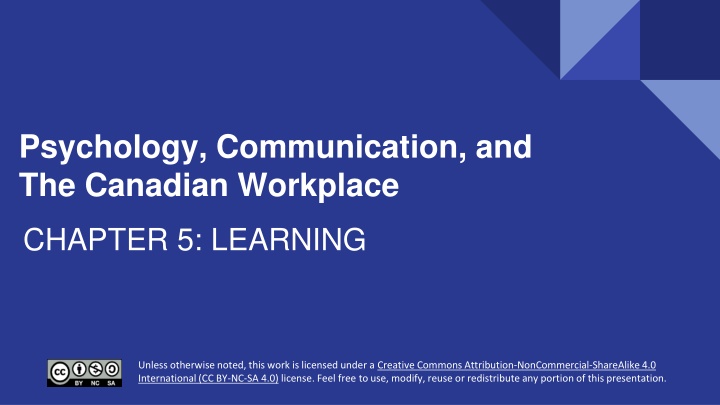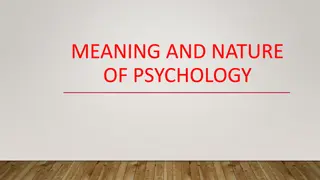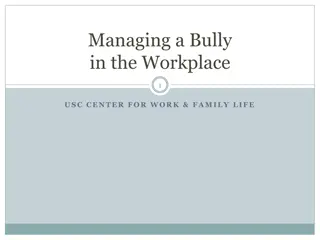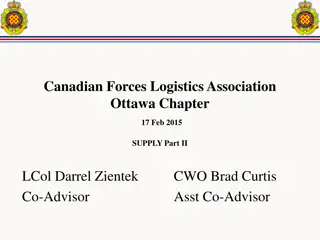
Learning Theories in the Canadian Workplace: Chapter 5 Overview
Explore the theories of learning including classical conditioning, operant conditioning, and social learning, and how they impact behavior management in the workplace. Enhance your understanding of the learning process and major influences on learning at work in this insightful chapter.
Download Presentation

Please find below an Image/Link to download the presentation.
The content on the website is provided AS IS for your information and personal use only. It may not be sold, licensed, or shared on other websites without obtaining consent from the author. If you encounter any issues during the download, it is possible that the publisher has removed the file from their server.
You are allowed to download the files provided on this website for personal or commercial use, subject to the condition that they are used lawfully. All files are the property of their respective owners.
The content on the website is provided AS IS for your information and personal use only. It may not be sold, licensed, or shared on other websites without obtaining consent from the author.
E N D
Presentation Transcript
Psychology, Communication, and The Canadian Workplace CHAPTER 5: LEARNING Creative Commons Attribution-NonCommercial-ShareAlike 4.0 International (CC BY-NC-SA 4.0) Creative Commons Attribution-NonCommercial-ShareAlike 4.0 International (CC BY-NC-SA 4.0) Unless otherwise noted, this work is licensed under a Creative Commons Attribution-NonCommercial-ShareAlike 4.0 International (CC BY-NC-SA 4.0) license. Feel free to use, modify, reuse or redistribute any portion of this presentation.
Learning Outcomes Upon successful completion of this chapter, you should be able to: In this chapter, we will: Define learning. Describe different theories of learning, including classical conditioning, operant conditioning, and social learning. Explain ways in which learning theories influence behaviour management in the workplace.
5.1 Learning I Learning may be defined, for our purposes, as a relatively permanent change in behavior that occurs as a result of experience. Tim Mossholder Unsplash Photo by Tim Mossholder on Unsplash
5.2 Classical Conditioning Classical conditioning is the process whereby a stimulus- response (S-R) bond is developed between a conditioned stimulus and a conditioned response through the repeated linking of a conditioned stimulus with an unconditioned stimulus.
5.3 Operant Conditioning Operant conditioning theory is the simplest of the motivation theories. It basically states that people will do those things for which they are rewarded and will avoid doing things for which they are punished. General Operant Model: Stimulus > Response > Consequence
5.4 Social Learning Theory Social learning theory is defined as the process of molding behavior through the reciprocal interaction of a person s cognitions, behavior, and environment (Bandura, 1977).
5.5 Learning at Work I Major Influences on Learning An individual s desire to learn, background knowledge of a subject, and the length of the learning period are some of the components of a learning environment. Photo by Brooke Cagle on Unsplash
5.5 Learning at Work II Organizational Behaviour Management This is a systematic application of reinforcement theory to modify employee behaviours in the workplace. The model consists of five stages.
5.6 Key Takeaways Learning is a relatively permanent change in behavior that occurs as a result of experience. Principles of classical conditioning can help us to understand stimulus-response associations that form in the workplace. Reinforcement, punishment, avoidance learning, and extinction can all be used in the workplace to change behaviour. Schedules of reinforcement can be used in the workplace to modify behaviour. According to social learning theory, we can also learn behaviours through interaction with your thoughts, actions, and environment. We can also observe rewards and consequences from others and model this behaviour in a process called vicarious learning. Our motivation, previous experiences, and other factors can help us to better understand how and why we learn. Organizational behaviour management and behavioural self-management can be used to change behaviours in the workplace setting.






















